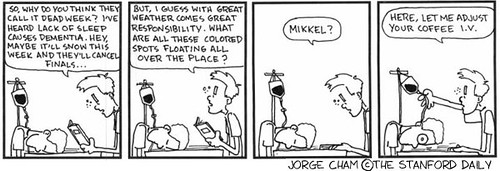Comps, or comprehensive exams or qualifying exams, are what students in Ph.D. track programs take at the completion of all the course work (usually) or around the end of the third year in the program. From what I know of them - so mostly in applied psychology fields - they literally encompass anything you might have learned in a course (or were expected to learn) or what might have been offered in courses you didn't take, but could have.
It's the entire subject matter that you are getting a Ph.D. in... this includes history, current issues, definitions, measurement and procedural knowledge... literally everything you can think of.
While the process and timelines differ by program and discipline, the one thing they all share is the unbelievable amount of stress and pressure associated with them. You study for at least a semester, if not more, usually while continuing to take classes. There is no study guide (or guide really at all) and there's virtually no way you can ever feel fully prepared for them - after all, you could not possibly have read every article, every book, every blog, every conference paper or presentation, attended all conferences and presentations... at some point, you have to just be confident that you know enough to take on most questions. Basically, it's terrifying and in many ways, the opposite of what any Ph.D. student is used to feeling, at least in preparing for any school work or exams.
The other part of this whole process that's in many ways unique for doctoral students is the collaboration. This doesn't happen in every program throughout the country, but at least for me, I was studying and dividing up book and chapter summaries with the other members of my cohort who were taking this exam with me. We met weekly (at least) and literally had to rely on each other and each other's work in order to cover all the most basic materials.
It's interesting to think about how, up until this point, we rarely work together in such a truly interdependent manner for such an extended period of time (and certainly not with such high stakes), yet once we we graduate (or maybe the closer we get to graduation), the more this is expected of us. Professors collaborate with their graduate students and each other and practitioners often work as part of a team - whether it's a consulting firm or an organization or an interdisciplinary team.
 I'm sure the evil genius who created comps was probably not thinking about them in such a meta-cognitive way and didn't realize the ways in which the very process prepares doctoral students for their futures, but it's odd to realize how much this happens anyways, even if we don't want it to.
I'm sure the evil genius who created comps was probably not thinking about them in such a meta-cognitive way and didn't realize the ways in which the very process prepares doctoral students for their futures, but it's odd to realize how much this happens anyways, even if we don't want it to. In our future careers, our very livelihood will depend on others - at least for most of us in the social sciences - and it's odd to think that this test, which many think has very little utility for future practitioners, actually teaches us about ourselves and how we work as well as the content of the material. Honestly, at most points in the process, I could barely grasp the minimum amount of material that we were supposed to be learning on, that we were consciously focused on.
Honestly, now that comps are over, despite the fact that I'm overwhelmed by catching up on everything else I didn't do while I was studying, I'm finding that the entire process provided me with a lot of food for thought... even though much of it is far from what I imagine was intended to be provoking my thoughts... anyone else ever find themselves thinking this way?



Comments